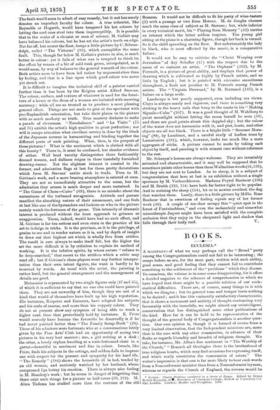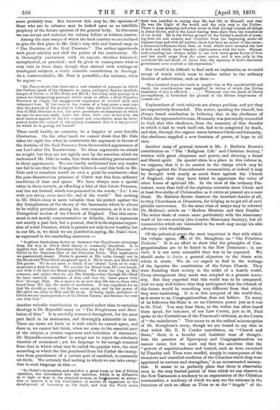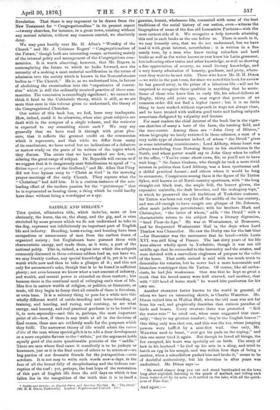BOOKS.
ECCLESIA.*
A MANIFESTO of what we may perhaps call the " Broad" party among the Congregationalists could not fail to be interesting ; the essays before us are, for the most part, written with such ability, good sense, and good feeling that they cannot fail to contribute
something to the settlement of the " problems " which they discuss. To ourselves, the volume is in some sense disappointing, for it offers a decided negative to the schemes of comprehension in which we have hoped that there might be a possible solution of our eccle- siastical difficulties. There are, of course, many things in it with which we disagree ; but its general tone and temper leave nothing to be desired ; and it has this eminently satisfactory characteristic, that it shows a movement and activity of thought contrasting very favourably with the immobile, we might almost say unintelligent, conservatism that has distinguished some other publications of the kind. How far it can be held to be representative of the thought of the general body of Congregationalists is another ques- tion. Our own opinion is, though it is formed of course from a very limited observation, that the Independent ministers are, more than is the case with any other communion, in advance of their flocks as regards liberality and breadth of religious thought. We take, for instance, Mr. Allon's fine sentiment in "The Worship of the Church," " Beneath all theologies there is the brotherhood of true religious hearts, which may find occasions for expressing itself, and which really constitutes the communion of saints." The writer's impression is that one is far more likely to hear such words from a Nonconformist minister than from a Nonconformist layman, whereas as regards the Church of England, the reverse would be
• Ecclesia: Church laps considered in a Series of I"s..says. Edited by Henry Robert Reynolds„D.11., President of Cheabunt College; Fellow of University Col lege, London. London: Hodder and Stoughton. 1870.
more probably true. But however this may be, the opinions of these who are in advance may be looked upon as an infallible prophecy of the future opinions of the general body. In this sense we can accept and welcome the volume before us without reserve.
Among the nine essays of which the book consists we are inclined to give the first place to Mr. Dale's very able and learned essay on "The Doctrine of the Real Presence." The author apprehends with great subtlety and skill the points of the controversy. He is thoroughly conversant with its aspects, whether historical, metaphysical, or practical ; and he gives in consequence what is very rare in these days, though they abound with writings on theological subjects, a really valuable contribution to theology. As a controversialist, Mr. Dale is powerful,—for instance, when he argues :—
"Dr. Pusey shows that there are a vast number of passages in which the Fathers speak of the elements as types, antitypes, figures, symbols, images of Christ or of His Body and Blood ; but every such passage is a reason for interpreting passages which seem to affirm a Real Objective Presence as simply the exaggerated expression of excited faith and vehement love. If but once in the course of a long poem a man says that the portrait of his mother is before him, the most fervent declara- tion of filial devotion to her, the most passionate exclamations in which he says ho sees her smile, hears her voice, finds rest in her love, the most earnest appeals to her for counsel and consolation, must be inter- preted under the control of the solitary statement that it is her portrait on which he is gazing, not herself."
There could hardly, we conceive, be a happier or more forcible illustration. On the other hand, we cannot think that Mr. Dale takes the right line when he controverts the argument in favour of the doctrine of the Real Presence from the recorded appearances of our Lord after His Resurrection. To these arguments we attach no weight, but they are not rightly met by the assertion which we understand Mr. Dale to make, that there was nothing preternatural in these appearances. We can hardly understand how any reader can fail to see that the Evangelists believed—and this both to Mr. Dale and to ourselves would on such a point be conclusive—that the post-Resurrection presence of Christ was free from ordinary conditions of time and space. We have always seen a special value in these records, as affording a hint of that future Presence, real but not limited, which was promised in the words, " Lo ! I am with you alway, even unto the end of the world." But nothing in Mr. Dale's essay is more valuable than his protest against the dry Zuinglianism of the theory of the Sacrament which he allows to be widely prevalent among his own communion, as it is in the Evangelical section of the Church of England. That this sacra- ment is not merely commemorative or didactic, that it represents not merely a past fact, but a preseut, that it is the supreme expres- sion of a real Presence, which is present not only in our worship, but in our life, is, we think we are justified in saying, Mr. Dale's view, as expressed in his concluding sentences
"Anglican theologians derive an immense but illegitimate advantage from the way in which their theory is commonly described. It is implied that all other Protestant theories deny tho Real Presence' of Christ in tho Supreme Rite of the Christian Faith. This implication we passionately resent. Christ is present at His table, though not in the Bread and Wine which are placed upon it. He is there, as a Host with His guests. We do not meet to think of an ' absent' Lord, or to com- memorate a dead Saviour. We receive the Bread from His own hands, and with it all that the Bread symbolizes. We drink the Cup in His presence, and rejoice that we are His friends,—that through His blood we have received 'remission of sins,' and that we 'have peace with God' through Him. He is nearer to us now than He was to those who heard from His lips the words of institution. It was expedient for us that He should go away ; for Ho has come again, and by the power of His spirit we abide in Him and He in us. In being made partakers of Christ we are 'made partakers of the Divine Nature,' and become for over one with God."
Another valuable contribution to general rather than to sectarian theology is Dr. Reynolds' essay ou "The Forgiveness and Abso- lution of Sins." It is carefully reasoned throughout, for the most part lucid in its statements, and thoroughly admirable in tone. There are views set forth in it with which we cannot agree, and there is, we cannot but think, when we come to the essential part of the subject, a certain vagueness and indecision of statement. Dr. Reynolds seems neither to accept nor to reject the scholastic theories of atonement ; yet his language is far enough removed from that in which what may be called the popular view, the view according to which the Son purchased from the Father the exemp- tion from punishment of a certain part of mankind, is commonly
set forth. We certainly find nothing to which we can take excep- tion in such language as this:— "In Christ's incarnation and sacrifice a great force, or law of Divine operation, was introduced into the universe, which is as diffussive as is light or heat in the physical cosmos, as fundamental as attrac- tion or motion is to the constitution of matter, as important to the development of humanity as life itself, and that the Word made flesh was justified in saying that He had life in Himself, and that He was the Light of the world, and the only way to the Father. There is deep meaning and sober sense in God having created all things in Jesus Christ, and in the Lamb having been slain from the foundation of the world. He is the Divine ground of the Father's method of treat- ing both sin and sinners, and therefore from the beginning, under all dispensations and with all nations, there has been an arrest of the curse ; a thousand influences have been at work which have revealed the law of God, and which have blended righteousness with the love. Human understanding has always failed to see bow these great forces of love and law could surge from thli same centre, and it was only in the sacrificial life and death of Jests that the mystery of God's universal government ever reached a full expression."
Nor would it be difficult to find such an explanation as we could accept of words which seem to incline rather to the ordinary theories of substitution, such as these :-
"In a hundred ways the truth is taught that in His sacrificial life and death, the consideration was supplied in virtue of which the Divine remission of sins is effected Whatever else the death of Christ accomplished, it furnished the ground of the Divine forgiveness of human sin."
Explanations of such subjects are always perilous, and yet they are imperatively demanded. The writer, speaking for himself, has always found satisfaction in believing that in the obedience of Christ, the representative man, Humanity was potentially reconciled to God, that this obedience, from the necessity of that disorder in which it had to work itself out, had to be completed by death, and that, through the organic union between Christ and humanity, this obedience supplied a new fountain of power, of hope to all men.
Another essay of general interest is Mr. J. Baldwin Brown's contribution on "The Religious Life' and Christian Society," written with great eloquence and power, and showing a broad and liberal spirit. Its special claim to a place in this volume is, we suppose, that it is an answer to the charge which may be brought against the Nonconformist communities, or indeed it may be brought with nearly as much force against the Church of England, that they have failed to appreciate the value of other forms of spiritual life. In the view of the ordinary Pro- testant, more than half of the eighteen centuries since Christ and at least five-sixths of Christendom as it exists at present are a mere blank. Mr. Baldwin Brown deserves the heartiest thanks of all, be they Churchmen or Dissenters, for helping us to get rid of such pitiable narrowness. To the same class of essays may be referred Dr. Mullens's article on "Modern Missions and their Results."
The writer deals of course more particularly with the missionary work of his own society (the London Missionary Society), but all communities which are interested in the work may accept his able advocacy with thankfulness.
Of the polemical essays the most important is that with which the volume opens, t t of Dr. Stoughton, on "The Primitive
Ecclesia." It is an effort to show that the principles of Con- gregationalism are to be found in the New Testament ; in our view, it is not more successful than was to be expected. We should make in linzine a general objection to the thesis with which it starts. We do 210i expect to find in the writings of the Apostles the constitution of the future Church. They were founding their society in the midst of a hostile world. Every arrangement they made was adapted to a present neces- sity. But they expected that this world was to be conquered. And we may well believe that they anticipated that the Church of this future would be something very different from that which
they were instituting. It is in this conquest of the world that, as it seems to us, Congregationalism does not believe. To many
of its followers the State is an un-Christian power just as it was to St. Paul. You may hear them, as the writer has often heard them speak, for instance, of our Law Courts, just as St. Paul spoke to the Corinthians of the Proconsul's tribunal, as the Courts of "the unbelievers." This seems to us the radical misconception of Dr. Stoughton's essay, though we are bound to say that in that which Mr. E. R. Conder contributes, on "Church and State," there is a broader and healthier tone of thought. Into the question of Episcopacy and Congregationalism we cannot enter, but we must say that the assertion that the "powers of superintendence and control, such as were exercised by Timothy and Titus were needful, simply in consequence of the immature and unsettled condition of the Churches which they were appointed to nurture and strengthen," is an unwarranted assump- tion. It seems to us perfectly plain that there is observable even in the very limited period of time which we can observe in the New Testament a tendency to an organization of the Christian communities, a tendency of which we may see the outcome in the functions of such an officer as Titus or as the " Angels" of the
Revelation. That there is any argument to be drawn from the New Testament for " Congregationalism" in its present aspect —twenty churches, for instance, in a great town, existing without any mutual relation, without any common control, we absolutely deny.
We may pass hastily over Mr. H. Allon's " Worship of the Church" and Mr. J. Guinness Rogers' " Congregationalism of the Future," though both are interesting essays, as treating mainly of the internal polity and management of the Congregations com- munities. It is worth observing, however, that Mr. Rogers, in contemplating the future to which he looks forward, sees the necessity of a making a most material modification in the terms of admission into the society which is known in the Nonconformists bodies as " The Church." He is, as we understand him, in favour of abolishing the examination into the "experiences of conver- sion" which is still the ordinarily received practice of these com- munities. The concession is exceedingly significant ; we cannot but think it fatal to the Calvinistic theory, which is still, as we are more than once in this volume given to understand, the theory of the Congregational Churches.
Our notice of this book has, we feel, been very inadequate. How, indeed, could it be otherwise, when nine great subjects are dealt with in the compass of a single volume, and the reviewer is expected to say something about each ? We may say generally that we have read it through with great plea- sure, that it reflects the greatest credit on the communion which it represents, and that while we differ from many of its conclusions, we have noted but no indications of a defective or narrow study on the parts of its writers of the topics which they discuss. The errors that we have marked are few, con- sidering the great range of subject. Dr. Reynolds will excuse us if we suggest that it is dangerously near Sabellianism to speak of " a divine aspect or person of the Godhead," and Mr. Allon that Pliny did not hear hymns sung to "Christ as God" in the morning prayer-meetings of the early Church. Pliny repeats what the " Christiani " had told him. It is a curious instance of the mis- leading effect of the modern passion for the " picturesque " that he is represented as hearing them, a thing which he could hardly have done without being a worshipper or a spy.




































 Previous page
Previous page